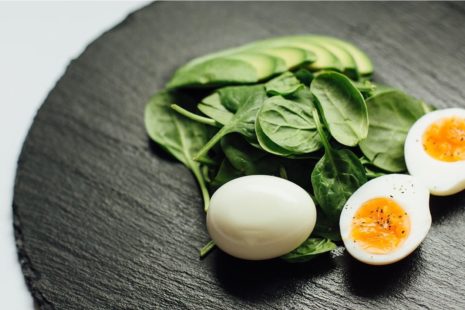Protein shakes are the go-to pre and post workout fix. But what types of powders should we actually be going for?
If you don’t know your whey from your hemp, or casein from your pea… Nutritionist Cassandra Barns is here to help.
Whey protein
“Whey protein from milk is still the most widely available and popular type of protein powder. It contains a very high percentage of protein – usually 90% or more. And it has an excellent profile of amino acids (the individual ‘building blocks’ of protein).
This means they’re present in more or less the exact proportions our body needs. Whey protein is also quickly and easily digested and absorbed compared to most other proteins. All these factors make it a top choice with gym-goers and those who are want to build strength or gain muscle.
There are also a few downsides to whey protein, however. It’s not suitable for vegans, of course. Those with a milk allergy can’t take it, and some people who are intolerant to dairy foods (without having a true allergy) also find that it doesn’t suit them. A lot of whey proteins on the market – especially those aimed towards fitness or muscle-building – contain additives such as sweeteners and flavourings. If you do go for whey, look for as natural a product as you can find”.
Soya protein
“Being plant-based, soya is an easy alternative for those who can’t have – or prefer to avoid – whey protein. Out of all the plant-based protein powders, it has two primary selling points that mimic the benefits of whey: it can contain a very high percentage of protein (up to 90%), and it also has a good amino acid profile, being a ‘complete’ protein. Some of the other plant proteins do not reach these standards!
Unflavoured soya proteins are also quite versatile and can be used in savoury foods – stirred into soups or stews, for example – as well as in smoothies or shakes.
Soya powders can also contain more phytoestrogens – natural plant substances that can act like a weak oestrogen. This could be beneficial for women, especially around or after menopause. But for the same reason, there’s a potential that using soya protein powder regularly and long term may not be the best choice for men’s health.
A downside to soya protein is that it can be less well tolerated than some of the other vegetable proteins (see below) for those who have food sensitivities or allergies”.

Pea protein
“Pea protein is an increasingly popular alternative to soya and whey. Again, it contains a relatively high percentage of protein – around 80% – so you need only a small amount of powder to get a good serving.
Like unflavoured soya protein, it has a neutral flavour and mixes well into both sweet and savoury foods. Its advantages over soya protein are that it tends to be better tolerated by those who have food sensitivities or intolerances, and that it doesn’t contain the phytoestrogens that soya contains.
Pea protein powders are generally free from sugars and unnatural ingredients such as sweeteners and flavourings, so tend to be a good natural option (but check the label or product details before you buy!)”
Try: Pea Protein Powder by Natures Plus – £22.50
Brown rice protein
“Rice protein has several similarities to pea protein. It’s also well tolerated by those with food sensitivities. It can have a similar protein content, although sometimes a bit lower: 65–80%. It has a neutral flavour, mixes well and can be used in sweet and savoury foods. Another good choice.”
Hemp protein
“Hemp seed protein is quite different to many of the other options including soya, rice and pea. It’s usually less refined, making it a more natural or ‘whole food’ alternative. This also means it contains more of the other nutrients found in hemp seeds, including fibre and essential fatty acids. Hemp protein can also be a great source of magnesium from the hemp seeds – a nutrient that many of us are deficient in, even if we eat a healthy diet.
On the downside, this greater content of other nutrients means a lower content of protein – which is generally around 50%. So you get less protein for your money and relative to the amount of powder you need to use. Hemp protein also has a stronger flavour than most of the others – and is an acquired taste for some!”
Sunflower seed protein
“Sunflower seed protein is the latest newcomer to the plant protein market. Like hemp, it tends to be less refined than some of the others, and closer to a ‘whole food’. But again, this makes it lower in protein, at only around 50%.
As an advantage over hemp, it has a milder flavour and, like pea and rice protein, mixes easily with many foods. Worth a try if you’re looking for an alternative to hemp protein or just a natural and mild-tasting protein powder”.
Try: Sunflower Protein Powder from Natures Plus – £22.50
Casein, or whey-casein blends
“Lastly, you can find casein protein powders (sometimes called ‘micellar casein’). Casein is another protein from milk. It is often found in combination with whey in protein powders aimed towards muscle gain.
Casein is digested and absorbed more slowly than whey protein, so the combination is said to provide both immediate protein replenishment to the muscles and a slower ‘drip-feed’, which makes it better for supporting muscle growth and a more effective protein to take in higher doses.
As it’s also from milk, casein protein is not ideal for everyone. It can, in fact, have more drawbacks than whey: it can be difficult to digest, and it’s more likely than whey to cause problems for those who are dairy-sensitive. If you can take whey but want a casein-free combination of fast-absorbing and slow-absorbing protein, try instead making your own mix of pure pea protein and whey”.

















One Response